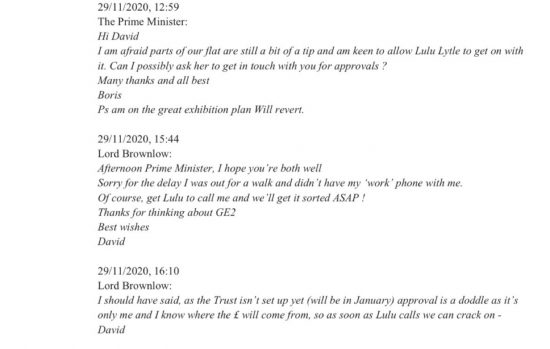
No one of sound mind can, I think, work out the reasoning of Lord Geidt when deciding to very largely exonerate Boris Johnson of all charges relating to the funding of the refurbishment of the Downing Street flat in letters published yesterday.
By refusing to reopen his original inquiry and by permitting himself to only consider whether his own original work was misleading because he had in turn been mislead by Johnson, Geidt was able to conclude that his original work was probably flawed but could stand only because he was able to conclude at the second time of asking that Johnson had inadvertently mislead him because he had changed his phone and so apparently forgotten events that any reasonable person could have recalled and was thus not guilty of misconduct even though if he had been candid in the first instance he would have been so.
And if you think that sentence convoluted, so was Geidt in what seemed to me his determination to absolve the Prime Minister from blame. When a person appointed to uphold ethics wriggles in that way it appears that signals are actually, and maybe inadvertently, being sent that something is profoundly wrong with the ethics actually being evidenced to be in use.
However, that is not the issue of most concern to emerge yesterday. This WhatsApp exchange has caused most interest:

What was or is The Great Exhibition? No one seems quite sure. But the possibility that some sort of trade or bargain appears to be going on is hard to ignore. Nothing is,of course, proven by messages without context, but reasonable questions can be asked, and we well know that this Prime Minister is unlikely to answer them, or at least honestly. He has, after all, only told falsehoods to parliament five times this week and refused all opportunity to correct matters. The result is that whatever he said we would not probably believe him.
And that is the real issue here. We have a prime minister who lies, persistently. The evidence of that is overwhelming. That he must be aware that he lies is certain, unless of course he is unable to identify a lie, in which case he would be unfit for office in any event. As a result Johnson has reduced the status of politics (which was already pretty low) to the point where credibility ceases to be an issue and it is becoming accepted by some in society that the only reason for holding office is to advance a person’s self interest.
I was interviewed by a journalist from the Wall Street Journal yesterday, who asked why I thought the UK’s reaction to Covid was so exceptional in a European context. My suggestion was that this was down to the special relationship we have with the USA. The result of that is that we, like the US, seem to now have around 30% of the population who will support a leader whose sole objectives are the maintenance of power for themselves at cost to democracy itself and the due processes associated with it. In the process they are willing to ignore the consequences for society at large since they act only in the interests of a tiny elite. Extraordinarily (unless you are a student of propaganda) they can achieve this by persistently lying, which is exactly what they do. That there is obvious evidence of harmful consequence, even to those who support them, appears at present no impediment to their progress.
The unusual duration of the interview suggested the journalist felt I had opened a rich seam, in which I explored themes around Rand, Hayek, the Mont Pelerin Society and its influence, and more. I felt I had been forced to face a truth. It is that, as President Biden noted yesterday, we face a common existential threat. Quite literally, democracy is in peril, with the risk coming from the deliberate destruction of the truth through the propagation of falsehoods that are intended to undermine faith in the body politic as a whole, aided and abetted by the undermining of due process. Remember that even the rule of law implicit in the power of the jury system has been questioned by ministers this week.
We need to worry. It is widely acknowledged now that the US is teetering in the brink of fascism. But so are we. But are we willing to stop it, or are a rather ugly 30 per cent winning?
This article first appeared on my blog: www.taxresearch.org.uk





